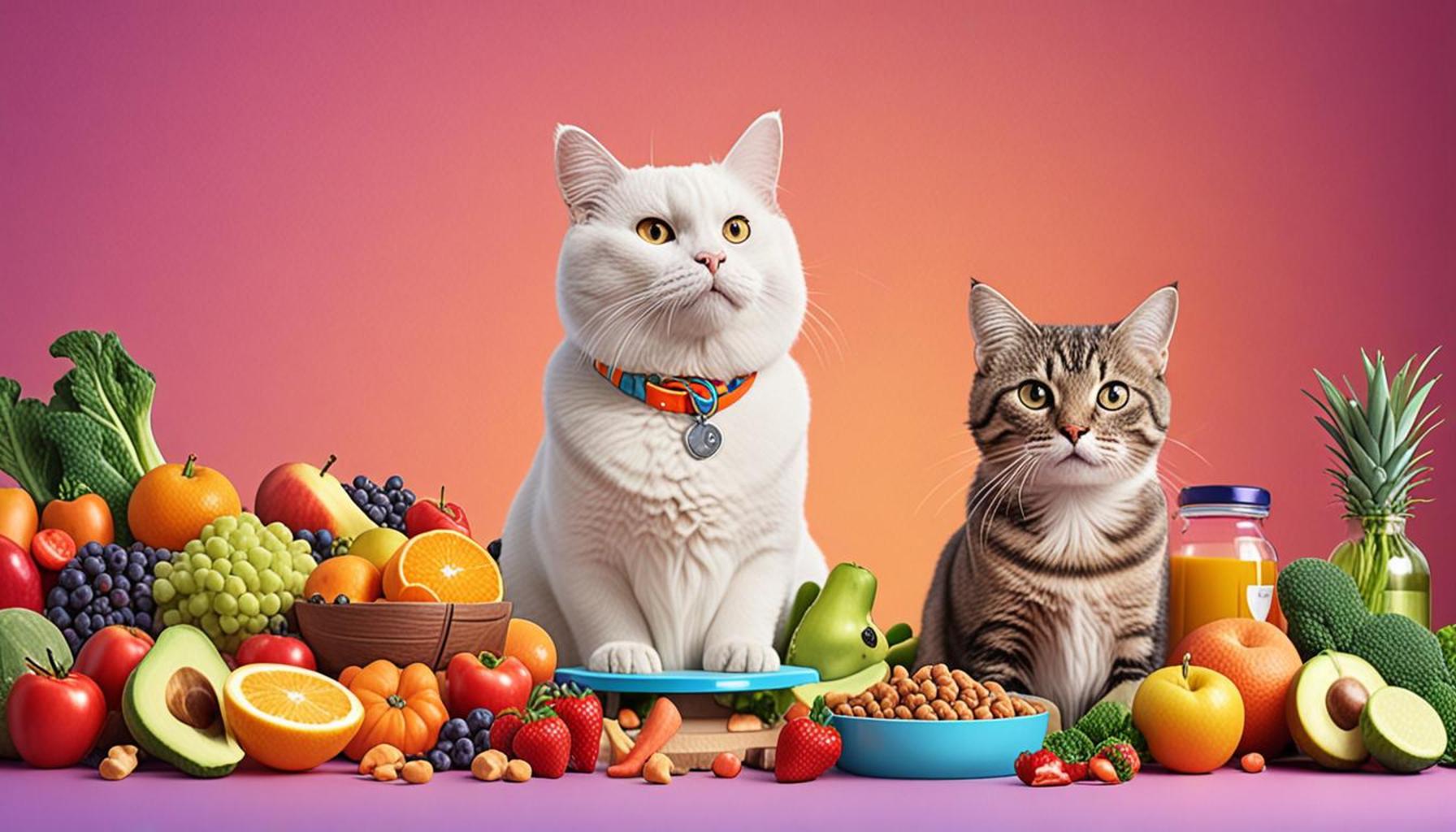The importance of a balanced diet for pet health

Understanding Pet Nutrition
It’s an important fact that pets require a balanced diet to thrive, similar to humans. A well-rounded nutritional plan plays a crucial role in a pet’s overall health and well-being, directly impacting their energy levels, coat quality, and longevity. With the right balance, pet owners can prevent various health issues and significantly enhance their furry friends’ quality of life.
Key Components of a Balanced Diet
When considering your pet’s diet, it’s essential to include a variety of nutrient-rich foods. Here are the fundamental components that collectively contribute to maintaining a balanced diet:
- Proteins: Proteins are the building blocks of muscle. For pets, quality proteins like chicken, beef, turkey, and fish are essential for muscle development and maintenance. A protein-rich diet supports not only growth but also the repair of tissues and the production of enzymes and hormones.
- Fats: Healthy fats are just as important as proteins. Omega-3 and Omega-6 fatty acids, commonly found in fish oil and flaxseed, provide energy and support healthy skin and fur. They also play a critical role in brain development and function, making them especially important for puppies and kittens.
- Carbohydrates: Carbohydrates serve as a primary energy source and can be particularly beneficial for active pets. Whole grains, fruits, and vegetables not only provide energy but also aid in digestion. For instance, sweet potatoes and brown rice are excellent sources of digestible carbohydrates.
- Vitamins and Minerals: A variety of vitamins and minerals are necessary for numerous bodily functions. Vitamins like A, D, E, and K play significant roles in immunity, vision, and bone health. Ensuring pets receive the right micronutrients is crucial for their overall vitality.
In the United States, pet owners spend billions on pet food each year, with a growing emphasis on high-quality options that prioritize natural ingredients and nutritional balance. It is important to remember that a balanced diet can vary significantly among different species and individual animals based on their age, size, and health status. This is why consulting with a veterinarian is advisable to tailor the best dietary plan for your pet.
The Consequences of Poor Nutrition
Neglecting your pet’s dietary needs can lead to a range of serious health problems, including:
- Obesity and Diabetes: Overfeeding, particularly with low-quality food, can lead to obesity, which significantly increases the risk of diabetes, heart disease, and joint issues.
- Dental Disease: A poor diet can contribute to tartar buildup and gum disease, which not only leads to pain but can also affect internal organs if bacteria enter the bloodstream.
- Skin Allergies: An inadequate diet can cause skin issues; for example, a lack of essential fatty acids can lead to dry, flaky skin and allergies.
- Reduced Lifespan: Ultimately, poor nutrition can shorten your pet’s lifespan, as chronic health problems can arise from neglecting their dietary requirements.
By investing time in understanding your pet’s nutritional requirements, you contribute not only to their health but also to their happiness. The journey toward better pet health begins with a commitment to providing a balanced and nutritious diet. Make informed choices and consult with professionals when necessary, ensuring your beloved companion leads a healthy and fulfilled life.

LEARN MORE: Click here for insights on giving a second chance
The Vital Role of Nutrition in Pet Health
Just as humans benefit from a balanced diet, pets also require a thoughtful combination of nutrients to thrive. The food choices available for pet owners greatly influence their animals’ health and well-being. When a pet consumes a nutritionally complete diet, it promotes optimal growth, energy levels, and resistance to disease, giving furry companions the best chance to lead happy, vibrant lives.
The Building Blocks of Pet Nutrition
To construct a well-rounded diet for pets, understanding the essential nutrients is crucial. Here’s a detailed look at the building blocks that contribute to a balanced diet:
- Proteins: Proteins are vital for a pet’s body structure. They facilitate growth, healing, and maintenance of muscle tissues. Essential amino acids, which pets cannot generate on their own, must be obtained through high-quality protein sources. Lean meats and fish should be prioritized, as they not only supply necessary proteins but also essential nutrients that support overall health.
- Fats: Incorporating healthy fats into a pet’s diet is as critical as including proteins. Omega fatty acids, particularly Omega-3 and Omega-6, derived from fish oils and certain seeds, are known for their anti-inflammatory properties and promote skin and coat health. Moreover, these fats are integral for cognitive function, especially in young animals whose brains are still developing.
- Carbohydrates: Although pets don’t have as much of a requirement for carbohydrates as humans, they can still serve as an important energy source. Including high-quality carbohydrates from whole grains, fruits, and vegetables offers both energy and dietary fiber, aiding digestion. Foods like quinoa and peas can provide the balanced carbohydrates necessary for maintaining an active lifestyle.
- Vitamins and Minerals: Vitamins and minerals are fundamental to a pet’s health, facilitating various metabolic processes and supporting immune function. For instance, vitamin A is crucial for vision and skin health, while calcium and phosphorus are integral for strong bone development. A diet lacking in essential micronutrients can result in serious health challenges over time.
With the pet food market in the United States surpassing billions in annual sales, there’s a noticeable shift toward cleaner, more high-quality ingredients, emphasizing the importance of nutritional balance. However, the perfect diet will vary from one animal to another due to factors such as age, breed, and individual health conditions. This variability makes it all the more vital for pet owners to consult veterinarians, who can offer personalized dietary recommendations tailored to their pet’s specific needs.
Understanding the Impact of Poor Nutrition
The risks associated with neglecting a pet’s dietary needs extend beyond mere weight gain. A poor diet can contribute to numerous health issues, such as:
- Obesity and its Complications: Inadequate nutrition often leads to obesity, heightening risks for serious conditions like diabetes and heart disease. Regular monitoring of food portions and choosing high-quality options can prevent this epidemic.
- Dental Problems: A diet devoid of necessary nutrients can lead to dental issues, where tartar and plaque build-up become prevalent, opening doors to pain and infections.
- Skin and Coat Health: Lack of essential fatty acids in a pet’s diet can lead to dry skin, excessive shedding, and allergies, creating discomfort for the pet.
- Life Quality and Longevity: Ultimately, neglecting a balanced diet can reduce a pet’s lifespan, as chronic health problems often stem from poor nutrition.
To ensure pets lead healthy, fulfilled lives, it is essential for owners to remain diligent about their nutritional choices. Understanding dietary needs and making informed decisions can vastly improve your pet’s life quality and longevity, fostering not just health, but happiness as well.
| Aspect of a Balanced Diet | |
|---|---|
| Variety of Nutrients | A balanced diet ensures pets receive essential vitamins, minerals, and proteins necessary for their growth and energy. |
| Weight Management | Proper portions and balanced meal compositions help prevent obesity and associated health issues. |
| Stronger Immunity | A well-rounded diet supports a healthy immune system, leading to fewer illnesses and prolonged health. |
| Improved Coat and Skin Health | Essential fatty acids promote a shiny coat and prevent skin irritations, enhancing overall appearance. |
Maintaining a balanced diet for pets is not just a good practice; it’s a cornerstone of their overall well-being. The elements discussed above play a pivotal role in keeping our furry friends healthy and vibrant. Understanding how each component of their diet impacts their physical health can lead to better pet care choices. A pet with a properly balanced diet experiences improved vitality, behavior, and longevity. Therefore, monitoring their nutritional intake and adjusting as necessary based on their age, breed, and specific health concerns is crucial to fostering a long and happy life.
DON’T MISS: Click here for essential dental tips
The Dangers of Commercial Pet Foods
Many pet owners often gravitate towards commercial pet foods due to their convenience and widespread availability. However, not all pet food brands prioritize the nutritional needs of animals. A significant number of products on the market contain fillers, artificial additives, and low-quality ingredients that may compromise a pet’s health. Reports from the Association for American Feed Control Officials (AAFCO) suggest that a staggering percentage of pet food lacks adequate nutrients, which can lead to deficiencies over time.
Understanding the ingredient list is paramount. Ingredients are typically listed in descending order based on their weight, so if you see vague terms like “meat by-products” or “animal digest” at the top of the list, it may indicate a diet deficient in essential nutrients. Pet owners should seek out products with specific protein sources, such as “chicken” or “salmon,” and whole ingredients, rather than by-products.
The Need for Tailored Nutrition
Just as human dietary needs evolve, so do those of pets. Various factors, including age, activity level, and health status, require tailored dietary approaches. For instance:
- Adjusting for Life Stage: Puppies and kittens require higher protein levels for growth, while senior pets may benefit from lower calorie diets to prevent obesity. Foods specifically formulated for each life stage ensure pets receive the right nutrients at the right time.
- Addressing Health Conditions: Pets with certain health issues may require specialized diets. Conditions such as kidney disease, allergies, or digestive problems might necessitate specific food formulation for managing symptoms and enhancing overall well-being. Consulting with a vet can lead to effective dietary strategies in these cases.
- Activity Considerations: Active or working dogs, for example, may thrive on diets higher in protein and fat to support their energy expenditure, whereas less active pets may require lighter, calorie-restricted options to counteract weight gain.
The Role of Fresh Foods in Pet Diets
Recently, a growing movement among pet enthusiasts has embraced the idea of incorporating fresh foods into pet diets. Many health-conscious owners are exploring home-cooked meals or adding fresh ingredients, such as vegetables, fruits, and lean meats, to commercial pet food to enhance nutrition. Research indicates that fruits like blueberries and pumpkins can provide additional antioxidants and fibers, proving beneficial for digestive health and overall vitality.
However, embarking on a homemade diet requires careful planning. Certain foods, like grapes, onions, and chocolate, are toxic to pets and should always be avoided. Engaging with a veterinarian or a certified pet nutritionist can facilitate the transition and ensure pets receive a balanced mixture of nutrients while enjoying fresh, wholesome meals.
The Psychological Benefits of a Balanced Diet
Beyond physical health, nutrition plays a pivotal role in the psychological well-being of pets. Proper nutrition has been linked to better behavior and mood stability. A well-fed pet is less likely to exhibit signs of anxiety or destructive behavior, contributing to a harmonious household. For instance, certain nutrients such as taurine are essential for cognitive function in cats, and lack of it could lead to behavioral issues.
Additionally, engaging pets during mealtime by incorporating interactive feeders can promote mental stimulation, further enhancing their quality of life. This connection between diet and behavior emphasizes the far-reaching impacts of a balanced diet.
With increasing awareness of these factors, pet owners now have the tools needed to provide their companions with a balanced, nutritious diet, laying the foundation for robust health and a happy life shared with their beloved pets.
DISCOVER MORE: Click here to learn about customized supplies for special needs pets
Conclusion: The Foundation of Pet Wellness
In summary, the significance of a balanced diet in maintaining optimal pet health cannot be overstated. Proper nutrition goes beyond mere sustenance; it lays the groundwork for a longer, healthier life filled with vitality and joy. Understanding the nature of commercial pet foods and the potential pitfalls of low-quality ingredients is crucial for pet owners aiming to make informed food choices for their furry companions.
Moreover, recognizing that each pet has unique dietary requirements based on factors such as age, activity level, and specific health conditions allows for tailored nutritional approaches that can lead to improved health outcomes. Incorporating fresh foods into a pet’s diet, along with consulting with a veterinarian or nutritionist, empowers owners to enhance their pets’ diets further, ensuring a comprehensive intake of essential nutrients.
The linkage between a balanced diet and a pet’s mental well-being also highlights the broader implications of nutrition, proving that what pets consume not only affects their physical stature but also their behavior and emotional health. As awareness among pet owners grows, the opportunities to improve the quality of pet diets expand significantly.
Ultimately, understanding the complexities of pet nutrition and the profound impact it has on both physical and psychological well-being can lead to remarkable improvements in a pet’s overall health. This underscores the importance of being proactive in seeking out the best dietary practices for your pet. By committing to providing a well-rounded and nutritious diet, pet owners can promote a life of happiness, health, and companionship, enriching the bond shared with their beloved animals.


